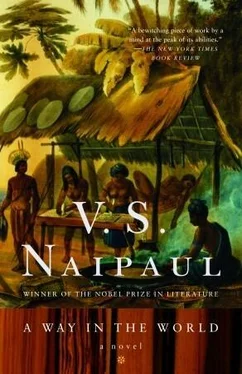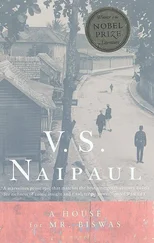For the rest of the time De Groot talked about the Swahili culture of the coast. This would have pleased Blair, the idea of the antiquity of Africa, the idea of African history, though he would not have been able truly to share De Groot’s enthusiasms. He had got his certificates and external degrees, but he was not in any wider sense a well-read or educated man. He would have had no idea of the cultures De Groot was talking about, no feeling for the dates or periods.
But here too he wished to show himself in a new light. He played down whatever pleasure he might have felt at this talk of African history, and he said at a certain moment, “Sometimes here, when people start talking about gold and ivory, you can believe you’re living in Biblical times. You almost expect them to start talking of peacock feathers.”
This appeared to be a reference to the job he had come out to do for the government, and it appeared to confirm compound stories that Blair had run into trouble with some politicians. They had expected him only to put a squeeze on the Asian community. He was doing a lot more: he had begun to look at the smuggling out of ivory and gold. This was as much of a drain on the country’s resources as the dealings of the harassed businessmen in the capital. It was well known that this kind of smuggling was being done by important men in the party, who (because of the regulations controlling the movement of people, and the innumerable new laws) now ruled in the interior with all the authority of old-fashioned chiefs, and (in spite of the talk of the socialist restructuring of society) often were connected to the old chiefly families.
De Groot said, after Blair had left, “He should be careful. They are not all like the president. There are some very wild men out there, and they can be pretty crude. The new power has gone to their heads. They feel they can do anything.”
I got another version of the same message from Richard some days later. He stopped me in the compound and said, “I have been looking up your friend’s record. He’s not exactly Mr. Clean, is he?” I knew then that Blair had begun to tread on important toes, and that Richard was already revolving in his head his defence of the regime, polishing his phrases, against anything that Blair might make public.
IT WAS as brutal and messy as De Groot had suggested it might be. And so shocking — even to Richard — that for some days no announcement was made of Blair’s death; no one would have known how to present it. Instead, there were rumours, some of them inspired by people who would have wanted Blair out of the way. The first was that he was killed in a brothel just outside the capital. Another was that there had been some kind of Asian conspiracy. Yet another, coming very quickly afterwards, was that his bungalow on the compound had been burgled, his papers and everything else of value stolen, and his houseboy had vanished. There was some truth in the last part of the story. His houseboy, Andrew’s kinsman, wasn’t seen again.
What was established, after some days, was that Blair’s body had been found in a showpiece banana plantation many miles from the capital. This plantation had been created with foreign advice and money, and was intended to be a model for the collectivized farms of the future. It had a special atmosphere. Old banana leaves, quickly drying and breaking down, and many inches thick, were used as a mulch. To walk on this mulch was like walking on a very thick, soft carpet. It deadened footsteps and seemed to absorb all other sound, and you very quickly began to feel uncertain about your footing. The people who had brought Blair or his body here seem to have intended to bury him below the mulch, but then they had been disturbed or had changed their minds. It was a day or two before the body was found and taken to the capital, and many days after that — and after a short official announcement of the death — before the body was flown back to Trinidad.
In the version of his death I carried in my imagination I saw Blair alive in that banana plantation, a big man floundering about in silence in his big, shiny-soled leather shoes in the soft mulch, between his sure-footed attackers. There would have been a moment in that great silence when he would have known that he was being destroyed, that his attackers intended to go to the limit; and he would have known why. And I feel that if, as in some Edgar Allan Poe story, at the moment of death, while the brain still sparked, a question could have been lodged in that brain—“Does this betrayal mock your life?”—the answer immediately after death would have been “No! No! No!”
Andrew grieved for his kinsman but didn’t want to talk about him. He continued to drink on weekends. On Mondays he would be red-eyed, with a very bad headache, as before. But now, in addition, grief dulled his skin; his face was like a carving, without mobility, the lips seemingly clamped together, the lower lip jutting. For some weeks he appeared to be close to tears.
Moses Lubero didn’t do his slow swivel of neck and eyes to look at me as I drove past. He took care now to look away, to be busy with what he was doing. Six weeks or so later the bicycle that had belonged to Andrew’s kinsman (and had before that belonged to Andrew) began to be ridden about in the compound by a new houseboy.
And Richard. Two years ago I was in Paris for the publication of one of my books. In a restaurant one day, near the end of a lunch with an overworked French journalist who was bluffing his way through an interview, someone behind me said in my ear in English, “A voice from the remote past.” It was Richard, without cigarette and ivory cigarette-holder. Twenty-five years had given him a lot of hair in his nostrils and ears. He was wearing a grey suit and he said he was working in Paris for a foundation, arranging scholarships for students from eastern Europe. He had left Africa and had married again. “The male menopause,” he said, in his brisk, seemingly jovial way. “What they call the change of wife.” That was like Richard: the tested phrase. I said, “It must be grim for you, seeing what’s happened in so many parts of Africa.” He said, “I don’t know what you’re talking about. I left Africa only because of what I told you. I wanted a change, and what I am doing now is much more valuable. Eastern Europe is much worse than anything in Africa. A place like Hungary had a perfectly good communist government. They gave that up, and now they are on the brink of ethnic conflict. Nobody says they are barbarians and savages.” That again was like Richard, still concerned only with the rightness of his principles, and somehow still safe.
I USED TO have a fanciful picture of the ceremonial return of Blair’s body to Trinidad: the aeroplane was at the airport, and the big casket was being shouldered down the steps by grave men in dark suits, four men or perhaps six. I knew the picture was fanciful, but its stateliness seemed correct for the occasion, until I began to question it. To take a casket of that size down the steps would have been impossible for four men or six men. Where would the casket have been in the aeroplane? It would have had to be battened down to the floor in some way. A number of seats would have had to be taken out; that would have meant that a plane had been chartered. That hadn’t happened, so that picture of the casket and the steps and the men in dark suits had to be set aside. The truth would have been simpler. The body would have been in a box, and it would have been placed in a refrigerated part of the aircraft’s hold. The body would have been embalmed in Africa; that meant the internal organs would have been removed. At the airport in Trinidad the flaps of the hold would have opened, and when the time came the box would have been transferred to a low trailer, and perhaps in some way hidden or covered. There would have been formalities. Would the embalmed body in its box then have been transferred to a hearse? The hearse didn’t seem right. I made enquiries. I was told that the box would have been taken away in an ambulance to Port of Spain, and then the shell of the man would have been laid out in Parry’s chapel of rest.
Читать дальше












